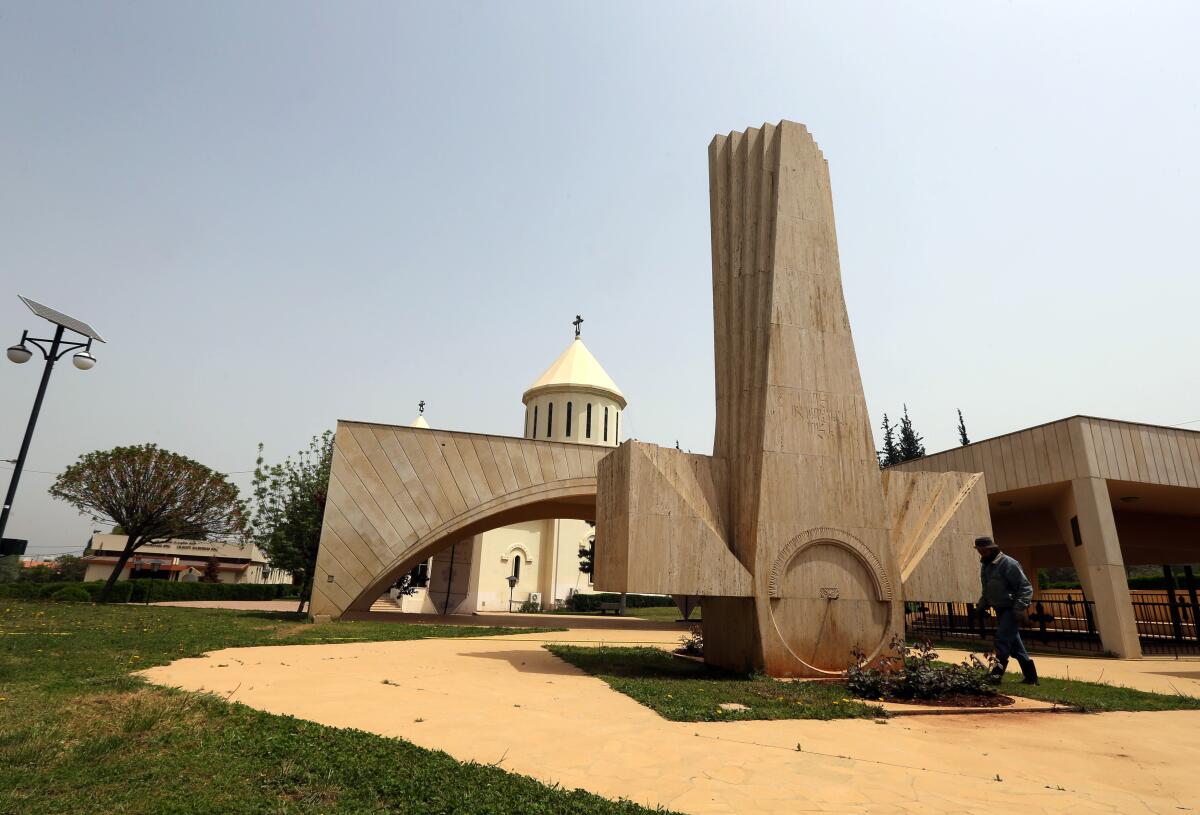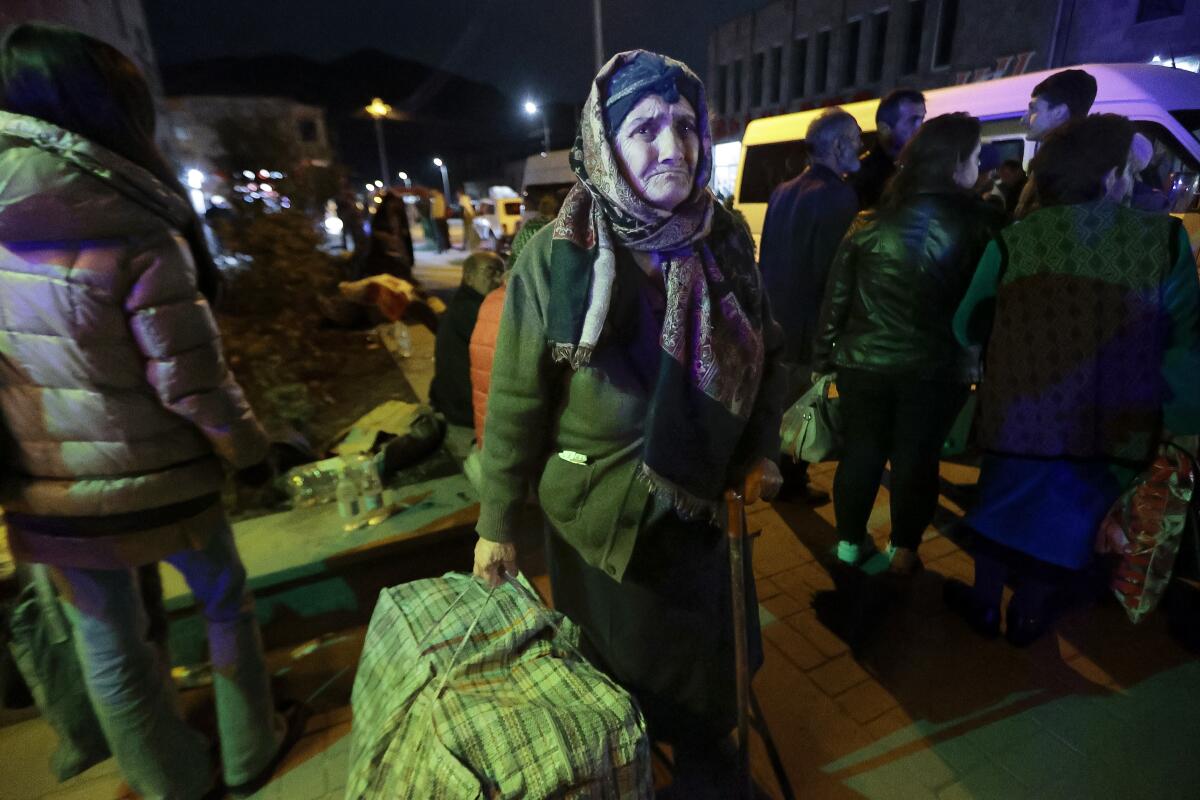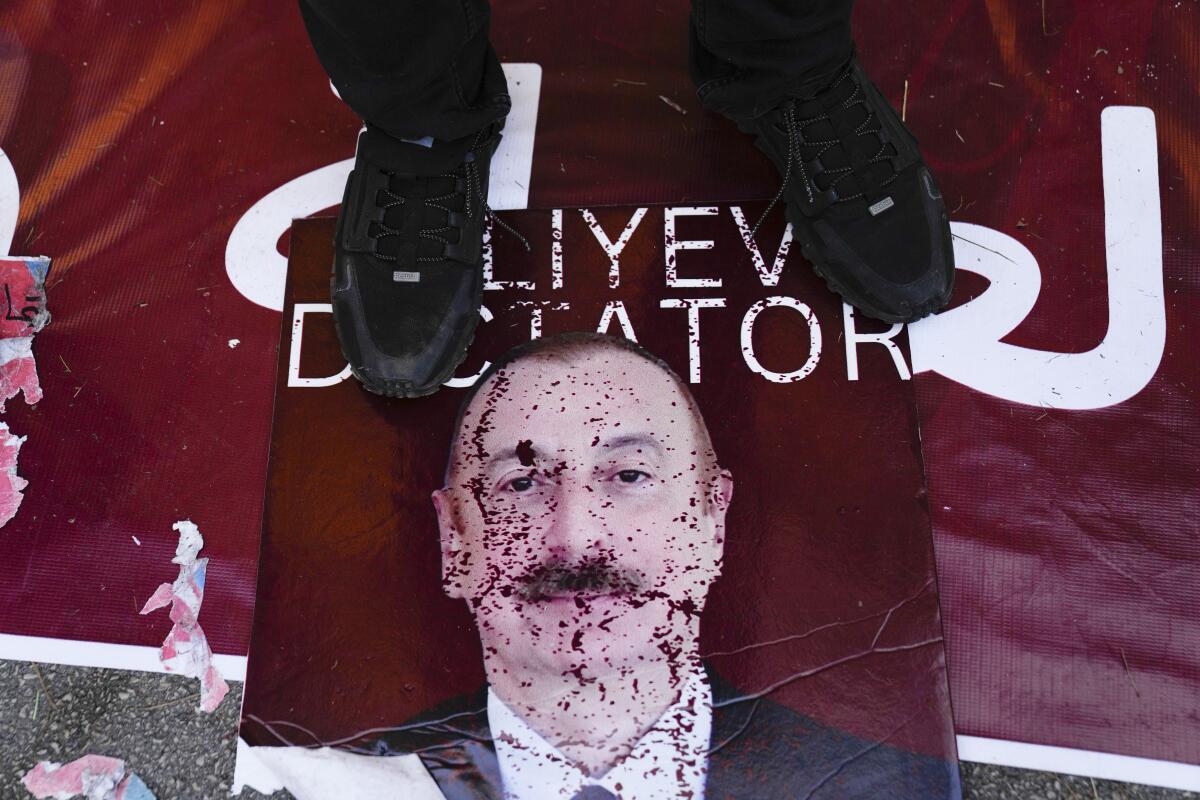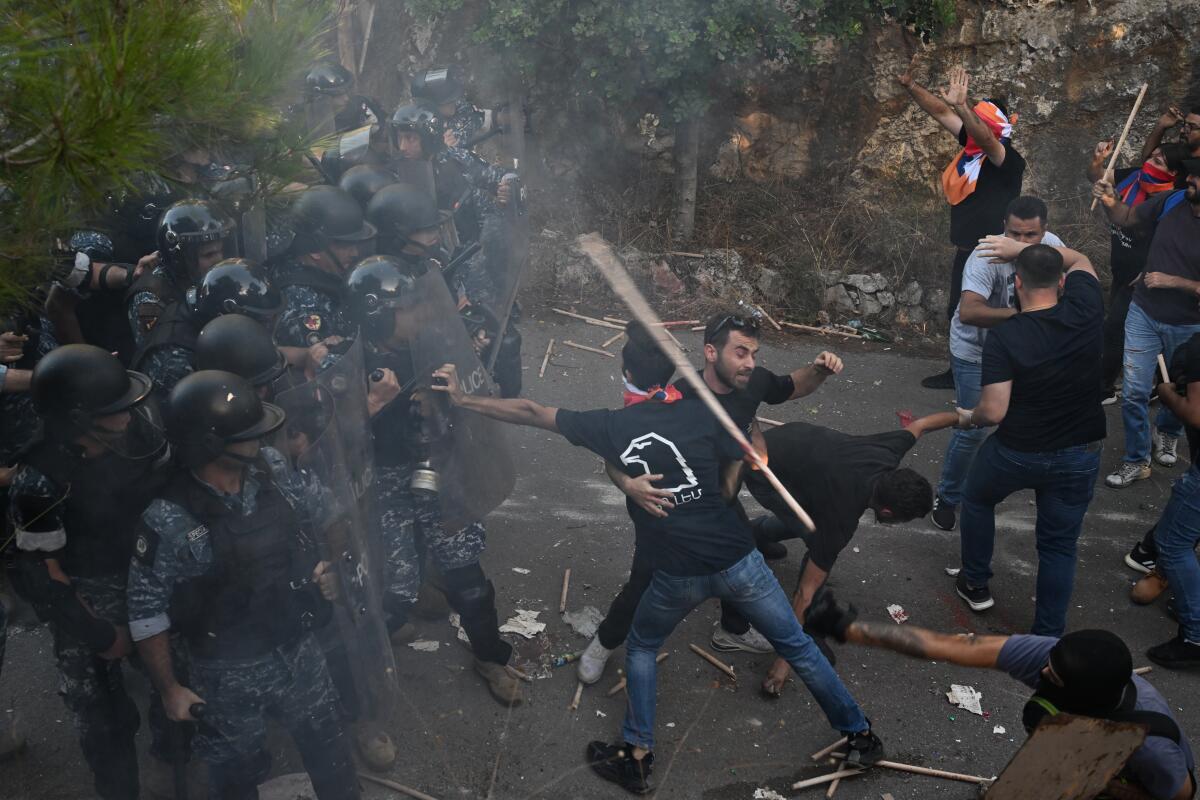ANJAR, Lebanon — Hilda Doumanian stood in the principle corridor of the Anjar museum, scanning the glass instances holding objects her ethnic Armenian forebears salvaged from their lands earlier than they escaped to Lebanon greater than eight many years in the past.
“This seems to be our destiny: to be forcibly displaced each few many years,” she stated, strolling as much as one of many shows: A set of rust-encrusted kitchenware and bundles of braided silk from a village loom. Historic-looking rifles. Non secular vessels. Bibles so previous their pages appeared extra suspended mud than paper.
“The Armenian genocide was the primary genocide of the twentieth century,” she stated, slowly shaking her head in resignation, referring to the 1915 genocide by the Ottoman Empire.
“Now within the twenty first century we see the primary genocide, and it’s Armenians once more.”

A gardener tends to the crops on the Armenian Genocide Memorial within the historic city of Anjar in Lebanon’s jap Bekaa Valley. The memorial commemorates the mass killings of Armenians as a part of the genocide below the Ottoman Empire in 1915.
(Joseph Eid / AFP by way of Getty Photos)
On Doumanian’s thoughts was the exodus happening over the past two weeks from what many Armenians see as their ancestral homelands — an extra erasure of their historical past.
Greater than 100,000 ethnic Armenians, fearing ethnic cleaning by the hands of their Azerbaijani adversaries, have deserted their houses in Nagorno-Karabakh, the mountainous enclave inside Azerbaijan’s internationally acknowledged borders the place they’d established their self-declared state.
Within the greater than 30 years of its existence, the Republic of Artsakh, not formally acknowledged by any nation, had established the trimmings of a rustic — a authorities, a standing military, a flag. But it surely all crumbled earlier than a withering Azerbaijani blitzkrieg final month, with the enclave’s leaders compelled to give up and announce the republic’s dissolution by the tip of the 12 months.
Although Azerbaijan’s authorities supplied to combine Nagorno-Karabakh’s ethnic Armenian inhabitants as equal residents, most, unwilling to countenance Azerbaijani rule, fled into Armenia in a refugee convoy that at its peak stretched greater than 60 miles. Fewer than a thousand stay behind. Those that fled cite the Azeris’ decades-old animus towards Armenians and the triumphalist rhetoric of Azerbaijani President Ilham Aliyev for his or her mistrust, it doesn’t matter what Azerbaijan says.
For thousands and thousands in Armenia and the diaspora, the lack of Nagorno-Karabakh, and the long-held dream of developing a state on Armenian homeland, was a blow. The shock resonates in a private method in Anjar, whose residents are virtually all ethnic Armenians whose ancestors fled right here from Musa Dagh, or Moses Mountain, a territory in what’s now southern Turkey.

An ethnic Armenian lady from Nagorno-Karabakh carries her suitcase to a tent camp after arriving in Goris, Armenia.
(Vasily Krestyaninov / Related Press)
When the folks of Musa Dagh heard of the approaching genocidal marketing campaign in 1915, they refused to obey Turkish authorities’ command to go away their homes within the mountains. They resisted for a month and a half, dropping 18 folks earlier than a French naval vessel rescued and took them to Egypt, the place they stayed for 4 years, returning after the Ottoman Empire’s loss in World Warfare I.
In 1939, when French authorities controlling the realm below a postwar mandate handed it to Turkey, the inhabitants of Musa Dagh confronted yet one more agonizing selection: Settle for Turkish management or depart. Fearing a repeat of the bloodshed in 1915, they have been escorted out by French troops to settle in Lebanon’s Bekaa Valley, on land purchased from an Ottoman feudal lord.
“We refused to reside below the Turks, as a result of we knew they’d do the identical factor as earlier than,” Doumanian stated.
Watching a brand new wave of displacement hit Armenians introduced again reminiscences of long-held ache, stated Isabel Kendirjian, a bedridden however alert 90-year-old who nonetheless remembers coming to Anjar when she was 6.
“It’s the identical factor that occurred to us. That is how we felt again then,” she stated.
“They gave us eight days to go away Musa Dagh. We took every part we might and went on the buses to right here,” she stated. “There was nothing. Only a few bushes. We lived in tents.”

A Lebanese Armenian steps on a defaced poster exhibiting Azerbaijani President Ilham Aliyev.
(Hussein Malla / Assoiated Press)
The brand new Anjaris stayed in these tents for roughly two years whereas authorities constructed up the city, organizing it into six neighborhoods, every named after a village in Musa Dagh. The homes the French supplied have been single-room buildings measuring 12 sq. ft together with a rest room.
“4 folks, 20 folks, it didn’t matter. Everybody was in a single room,” Doumanian stated.”We nonetheless name them beit Faransi, a French home, to this present day.”
Tensions between Muslim Turks and Christian Armenians date to the times of the Ottoman Empire, however the conflict for Nagorno-Karabakh was rooted within the fall of a extra modern empire: the Soviet Union.
In 1988, contained in the roiling Soviet panorama, the enclave’s ethnic Armenian majority selected to secede from one Soviet republic, Azerbaijan, and unite with one other, Armenia. The transfer sparked an ethnic battle with Azeris that noticed massacres and pogroms on either side, and an estimated million displaced folks, largely Azeris.
Six years later, by which period the Soviet Union had collapsed, the ethnic Armenians gained. They claimed Nagorno-Karabakh (which Armenians name Artsakh) and its surrounding districts in what different nations considered as a violation of worldwide legislation.
Donations poured in from the Armenian diaspora, together with from the the late California businessman and philanthropist Kirk Kerkorian, whose largesse helped funnel a whole bunch of thousands and thousands of {dollars} to fund colleges and a serious freeway within the fledgling republic. Cease-start negotiations through the years by no means obtained wherever.
Within the meantime, Azerbaijan had used its huge oil and fuel riches to retool its military. Armenia’s confidence in its skill to maintain the established order in Nagorno-Karabakh, to not point out its contempt for an enemy it had lengthy dismissed as cowardly, meant that it was woefully unprepared when Azerbaijan launched an assault in 2020 and snatched again many of the land it misplaced.
A cease-fire assured by Russia, Armenia’s major patron, was to be the prelude to a peace treaty. However tensions continued, culminating in Azerbaijan blockading the territory in December, then launching a lightning onslaught final month that routed the Artsakh Republic’s military. Moscow, preoccupied with its conflict on Ukraine and displeased with Armenian Prime Minister Nikol Pashinyan’s current overtures to the West, stood by as Azerbaijan pursued its marketing campaign.
Pashinyan, conscious of his army’s limitations and with little diplomatic backing, refused to intervene, infuriating many Armenians.
E-newsletter
Begin your day proper
Join Important California for the L.A. Instances largest information, options and suggestions in your inbox six days every week.
You might often obtain promotional content material from the Los Angeles Instances.
Varian Khoshian, the mayor of Anjar, feels ashamed on the loss. His ardour in regards to the idea of Artsakh runs so deep that he named his son — now an officer within the Lebanese military — after it.
He blamed the rout on Pashinyan and his coverage of antagonizing Armenia’s conventional ally, Russia, for the West’s sake, pointing to a different signal of fraying ties with Moscow that got here Tuesday when Armenia’s parliament ratified the Worldwide Felony Courtroom’s founding Rome Statute.
As a result of the courtroom in March issued an arrest warrant for Russian President Vladimir Putin for the conflict in Ukraine, the ratification means Armenia must arrest Putin if he stepped on Armenian soil. The Kremlin known as the choice “incorrect,” a place with which Khoshian agreed.
“We had a robust umbrella. We just like the West, certain, however we obtained a smaller umbrella from America that doesn’t cowl us,” he stated.
Throughout Lebanon’s 15-year civil conflict, Khoshian discovered to work with teams he didn’t like, but it surely was for the great of Anjar; Pashinyan ought to have finished the identical, the mayor stated.
“I don’t love the Russians. However I would like them for my homeland,” Khoshian stated. “That’s how it’s a must to assume. In any other case you lose.”
Regardless of all that, he insisted the conflict for Nagorno-Karabakh was not over.
“I can’t quit. We are going to come again. We have now to,” he stated. “These lands are the property of our ancestors.”
And it was greater than only a matter of feelings.
“We all know the worth of Artsakh, its strategic location for Armenia,” Khoshian stated.

Armenian Lebanese protesters conflict with safety forces close to Beirut.
( Houssam Shbaro / Anadolu Company by way of Getty Photos)
Azerbaijan, he continued, was intent on taking elements of southern Armenia for a land hall linking its territory to Nakhchivan, Azerbaijan’s exclave on Armenia’s southwestern facet.
“It’s the primary domino. As soon as Artsakh falls, you’ll discover different Armenian cities within the south falling.”
Armenians have been demanding a stronger army response, with protests amongst diaspora teams in Southern California and frequent demonstrations in Yerevan, Armenia’s capital, towards Pashinyan and what many see as his capitulation.
In Armenian-dominated neighborhoods in Beirut, graffiti targets Azerbaijan’s president, Aliyev, and his prime ally, Turkish President Recep Tayyip Erdogan. The stenciled graffiti calls Aliyev a killer and declares that Karabakh will all the time be Armenian. Lebanon’s major Armenian occasion held an indication in entrance of the Azerbaijani Embassy that turned violent. In Anjar, excessive schoolers had their very own anti-Turkish protest, carrying placards with Erdogan’s face and chanting their assist for Artsakh.
Yessayi Havatian, an agricultural provides service provider and Anjar historian, questioned whether or not the longer term destiny of Karabakh Armenians can be to go to conflict once more, or whether or not they would turn out to be just like the Armenians of Musa Dagh, reduce off from their ancestral lands.
“Our folks considered going again. For 14 years they refused to plant orchards on the land right here. Why? As a result of they stated, ‘We’re not going to remain that lengthy.’ They believed they’d go residence,” Havatian stated.
No matter Karabakh Armenians select, he added, it was clear that Armenians couldn’t pursue the conflict as they’d up to now.
“We the Armenians made a mistake: We relied on somebody aside from us to defend us. The world watched our folks forcibly displaced and did nothing. And nobody will do something,” he stated.
“Nobody will defend Armenia aside from the Armenians. That’s the answer.”
